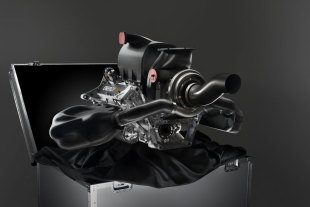- News
Renault reveals 2014 power unit

Renault has become the first engine manufacturer to reveal its new power unit for the 2014 Formula One regulations.
The engine was unveiled at the Paris Air Show at Le Bourget, and is named the Renault Energy F1. The 1.6 litre V6-turbo is set to be run by Red Bull, Lotus, Toro Rosso and Caterham and emphasising the increased relevance Renault says it has aligned the new unit with the rest of its engines for its road cars.
"From next year, one of greatest challenges in F1 will be to maximize energy efficiency and fuel economy while maintaining the power output and performance expected of F1 cars," Renault president Jean-Michel Jalinier said. "Renault has pioneered this technology in its road car engine range with the Energy series. Naming the Power Unit Energy F1 creates an unbroken range, from the Clio through to our competition department."
The maximum power of the new unit 'will exceed the output of current V8 F1 engines' and deputy managing director (technical) Rob White says the added output from the energy recovery system means it is no longer just an engine.
"The next generation of F1 cars will be powered by a turbocharged 1.6-litre V6 internal combustion engine of around 600 bhp plus around 160 bhp of electrical propulsion from the energy recovery system, meaning the term 'engine' will no longer fully describe a car's source of propulsive power. It is more relevant to refer to the complete system as a 'Power Unit."
White also moved to allay concerns about the noise produced by the new units.
''The car will still accelerate and decelerate rapidly, with instant gearshifts," he said. "The engines remain high revving, ultra high output competition engines. Fundamentally the engine noise will still be loud. It will wake you from sleep, and circuit neighbours will still complain. The engine noise is just a turbocharged noise rather than a normally aspirated noise: you can just hear the turbo when the driver lifts off the throttle and the engine speed drops.
''I am sure some people will be nostalgic for the sound of engines from previous eras, including the preceding V8, but the sound of the new generation Power Units is just different. It's like asking whether you like Motorhead or AC/DC. Ultimately it is a matter of personal taste. Both in concert are still pretty loud.''

